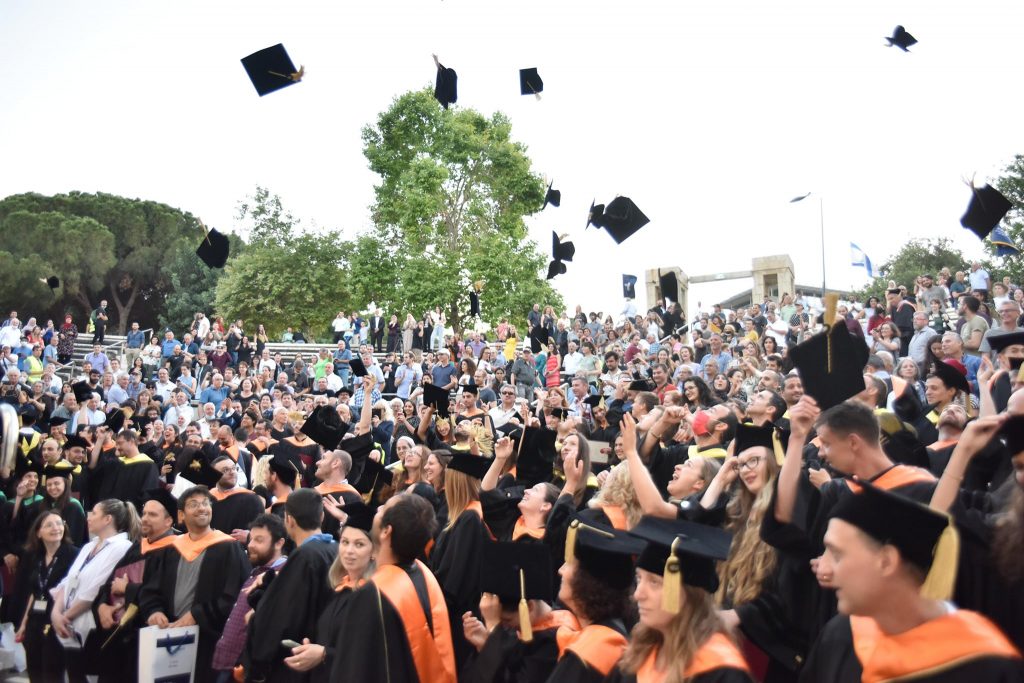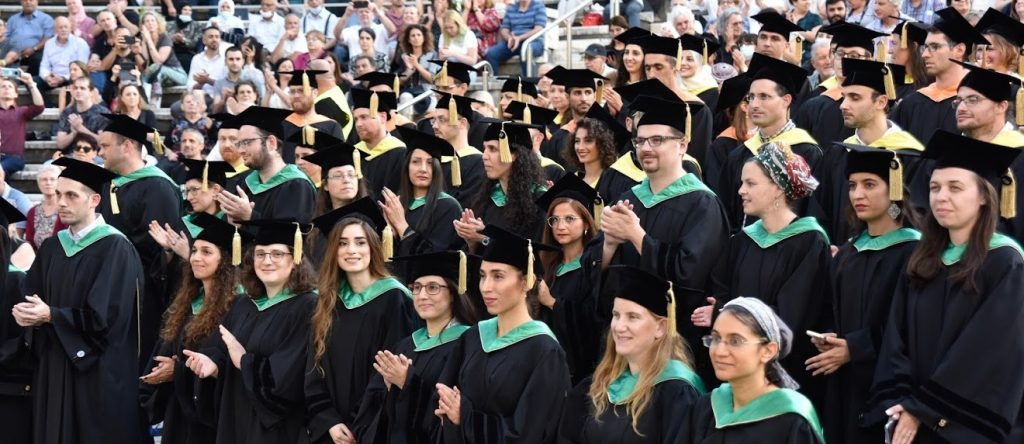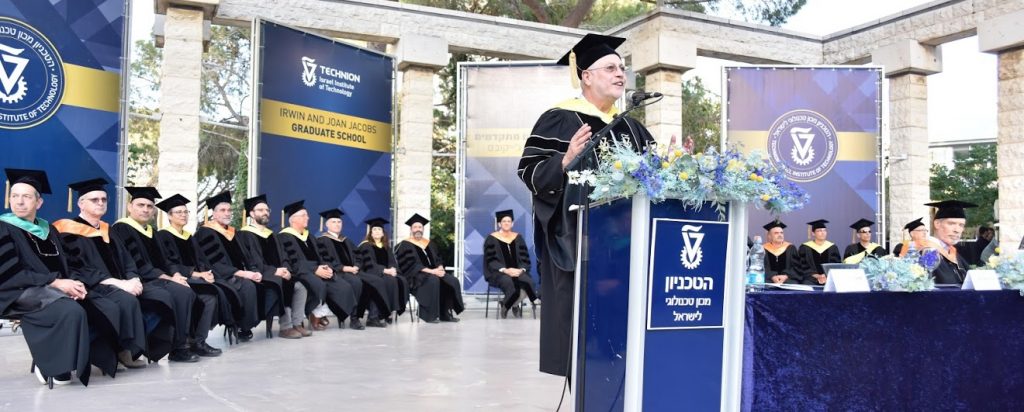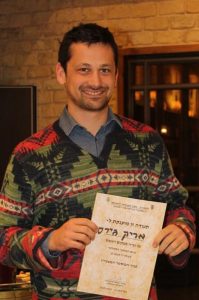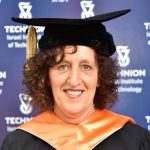A Beacon of Tolerance
CONGRATULATIONS! On May 24th, Technion awarded Ph.D. diplomas to 199 new graduates.
During the ceremony, Technion President Prof. Uri Sivan said that “leadership and personal accountability are the most effective and important responses to the challenges and difficulties that the events of recent days have repeatedly highlighted.”
On May 24th, the Technion awarded Ph.D. diplomas to 199 graduate students in a festive and moving ceremony at the Kellner Amphitheater. The ceremony was attended by the new graduates, their families, Technion management, Faculty deans, and staff.
Approximately 43% of new Ph.D. graduates are women, a new record, and a significant increase over previous years. Most of the graduates (124) are native Israeli, and the rest are from all over the world, including the U.S., Canada, France, Austria, Ukraine, Uruguay, Italy, Belgium, Brazil, Germany, India, and China.
The faculties with the highest number of graduates are the Rappaport Faculty of Medicine (27), Civil and Environmental Engineering (19), and Physics (16); 205 supervisors oversaw the doctoral candidates throughout their studies. Overseeing the supervisors is Head of the Faculty and Dean of Biotechnology and Food Engineering, Prof. Marcelle Machluf whose five students were among those receiving a Ph.D. degree during the ceremony.
Technion President Prof. Uri Sivan: “This is a celebration for all of you, who today can add ‘Dr.’ to your name, a celebration for your families who have accompanied you along the way, and a celebration for us, your teachers. We’ve accompanied you on the long road, taught you what we know, and just as importantly, we’ve learned from you. We have no doubt that you have acquired the best professional tools here. If you also know how to deal with the professional dilemmas you come across in social, environmental, and ethical contexts if you are a beacon of tolerance, equality, and empathy, and if you continue to ask questions – then we have done our job.”
Dean of the Graduate School Prof. Dan Givoli: “I have always believed that the two most important factors that impact the Technion’s prosperity are faculty members and doctoral students. You and your supervisors are the research foundations of the Technion.”
In addition, Prof. Givoli presented some data related to the current cohort: “One-third of the graduates took the direct Ph.D. track; three of the graduates are new immigrants, who immediately began their Ph.D. research at the Technion, in 2016; two graduates are a married couple – Dr. Ekhlas Homede Abo Jabal and Dr. Mohammad Abo Jabal, who completed their studies at the Technion and now teach at the Guangdong Technion-Israel Institute of Technology (GTIIT) in China. The ratio of supervisors to students was very high because many of them had more than one supervisor – a result of blurring boundaries between the disciplines and strengthening the interdisciplinary nature of scientific research.”
This trend is reflected in the research of Dr. Gil Wang of the Faculty of Civil and Environmental Engineering, who gave the valedictory speech on behalf of the new graduates. Dr. Wang completed his Ph.D. under the supervision of three Technion faculty members: Prof. Yiska Goldfeld, Prof. Nitai Drimer, and Prof. Yehiel Rosenfeld. “At the Technion, I was exposed to the heterogeneous, diverse, Israeli society, rich in colors and beliefs,” he said at the ceremony. “I look at the Technion – at us – and it gives me hope and fills me with optimism. The Technion model, which emphasizes perseverance, hard work, and the constant pursuit of excellence, makes any polarization in Israeli society irrelevant.”
Dr. Wang added that some of his peers “will continue their research here and overseas, some will go into the industry, others will go into teaching, and others to consulting, management and startups; but all fellow graduates will continue to lead and excel because this is their way, this is the Technion way.”
“Leadership and personal accountability are the most effective response”
Technion President Prof. Uri Sivan said: “In recent weeks, we’ve learned that the Technion plays a major role in dealing with both external and internal threats. The external crisis highlighted the extensive technological role Technion graduates played, and still play. But I want to focus on the other role of the Technion, as a factor in the healing of society’s divisions. Since its inception, the Technion has championed equality and tolerance. For 100 years, it has maintained an apolitical identity and has given male and female students the opportunity to live and learn in an atmosphere of tolerance, equality, and mutual respect, as part of our social commitment. We expect you to continue in this way. Leadership and personal accountability are the most effective and important response to the challenges and difficulties that the events of recent days have repeatedly highlighted.”
Technion’s youngest new Doctor is Arik Girsault, who completed his Ph.D. at the Faculty of Biomedical Engineering under the supervision of Prof. Amit Meller. Arik, 28, holds dual French and Swiss citizenship and is likely to soon be granted Israeli citizenship as well.
He was born in Paris, the son of a Swiss businessman and a French lawyer, and spent a large part of his childhood and youth moving from city to city due to his parents’ work. He studied at the Ecole Polytechnique Fédérale de Lausanne (EPFL) in Switzerland, from which he received his BSc and MSc in Life Sciences and Bioengineering. As he neared the end of his MSc program, “some of my professors recommended that I continue studying toward a Ph.D. at the Technion, which fitted in perfectly with my Zionist sentiments,” he says. “I wanted to spend time in Israel.”
Arik arrived at the Technion and met with some of the staff members at the Faculty of Biomedical Engineering. He based his decision on his impression of the supervisor and the students in the lab. For four and a half years, he worked on his major project, under Prof. Amit Meller’s supervision: the development of an advanced microscope for monitoring intracellular biomolecular processes at high temporal resolution. According to Prof. Meller, “Arik was an outstanding multidisciplinary student. He developed high skills in building a STED (Stimulated Emission Depletion) optical microscope, in preparing complex biological samples, and in computerized information processing using software that he himself developed.”
Arik devoted the little free time he had during his research to playing on the Technion tennis team and to reading books on Jewish thought. After completing his degree, he returned to visit his parents in Switzerland, but this is by no means his final destination. Arik decided to make Aliya and has already completed most of the formal arrangements. And what will he be doing here? “For the time being, all options are open – academia, industry, everything – but I have a feeling that I will be deciding in favor of the startup world, which seems challenging and interesting, and there is nowhere better than Israel to do this.”
The oldest new Doctor is Dr. Tirza Lauterman, 58, who completed her thesis under the supervision of Prof. Rakefet Ackerman of the Davidson Faculty of Industrial Engineering and Management. Dr. Lauterman first came to the Technion as a soldier-student in 1981, and after completing a BSc in Information Systems Engineering at the Faculty of Industrial Engineering and Management, she enlisted in the Navy, where she served for many years. Over the years, she advanced through the ranks, and her last position was Head of the Information Systems Branch of the Navy. In 2007, she retired with the rank of Lieutenant Colonel.
In 2010, nearly 30 years after she began her undergraduate studies, she began studying toward her master’s degree that continued into a Ph.D. Her research was in the field of problem-solving, and specifically the first impressions of people on encountering a problem and the consequences of this impression on coping with the problem. “After much research, we have come to the conclusion that first impressions determine a lot, just as they do with meeting people, and it significantly affects the time and effort that they will invest in solving the problem, as well as the final answer that comes after deep thought,” she says. “Acknowledging the existence of primary judgment is important for understanding engineering problems, and it also affects how tests and challenges are designed. If we design them in a way that will create confidence in the person’s ability to solve the problem, we will improve the person’s chances of solving it, and on the other hand, if we transmit an exaggerated impression of ease, the person might waste time trying in vain.”
Dr. Lauterman currently teaches at the Technion and at the Open University, and in the coming academic year, she will also begin teaching at Bar Ilan University. She is married, a mother of three, and a grandmother.



